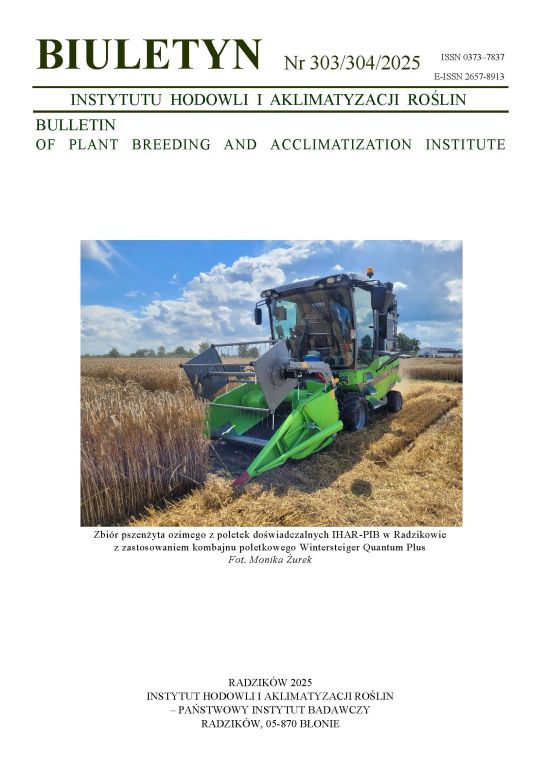Porównanie plonowania i elementów struktury plonu owsa uprawianego w różnych warunkach klimatyczno-glebowych
Kinga Szarek
kszur@urk.edu.plKatedra Ogólnej Uprawy Roli i Roślin, Akademia Rolnicza w Krakowie (Poland)
Kazimierz Klima
Katedra Ogólnej Uprawy Roli i Roślin, Akademia Rolnicza w Krakowie (Poland)
Abstrakt
W dwóch jednoczynnikowych doświadczeniach polowych zrealizowanych w latach 2003–2005, porównywano plon oraz elementy struktury plonu owsa uprawianego w siewie czystym oraz w mieszankach z jęczmieniem jarym jak również z pszenżytem jarym. Eksperymenty przeprowadzono w Górskiej Stacji Doświadczalnej KOURiR w Czyrnej k. Krynicy oraz w Mydlnikach k. Krakowa. Owies uprawiany w okolicy Krakowa (Mydlniki) uzyskał większy plon ziarna w porównaniu do uprawy w warunkach górskich (Czyrna), zarówno gdy był wysiewany w siewie czystym (o 61,6%) jak i w mieszankach (o 30,3-52,3%). Zastosowana metoda Rudnickiego wykazała, że bez względu na sposób siewu, o większym plonie owsa, uprawianego w Mydlnikach względem doświadczenia w Czyrnej, decydowała większa obsada wiech średnio w 66,0%, większa MTN w 31,6%, oraz dorodniejsze wiechy w 2,4%.
Słowa kluczowe:
owies, struktura plonu, warunki uprawy, mieszanki zbożoweBibliografia
Dzieżyc J. 1993. Regionalne zróżnicowanie środowiska przyrodniczo-rolniczego. W: Czynniki plonotwórcze — plonowanie roślin. PWN, Warszawa-Wrocław: 453 — 458.
Google Scholar
Górecki J., Grzesiuk S. 2002. Reakcje roślin na stresy. W: Fizjologia plonowania roślin. Wyd. UWM, Olsztyn: 448 — 451.
Google Scholar
Kaczorowska Z. 1962. Opady w Polsce w przekroju wieloletnim. Prace Geogr. IG PAN. 33: 1 — 107.
Google Scholar
Klima K., Struś L. 2001. Plonowanie mieszanek zbożowych z udziałem owsa w warunkach górskich Beskidu Niskiego. Zesz. Nauk. AR w Krakowie nr 375, Sesja Naukowa 77: 43 — 47.
Google Scholar
Kondracki J. 1977. Regiony fizjograficzne Polski. Wyd. Uniw. Warszawskiego, Warszawa.
Google Scholar
Michalski T., Idziak R. 1999. Plonowanie owsa rosnącego w mieszankach i siewie czystym w zależności od nawożenia azotowego. Żywność 1 (18). Supl.: 38 — 45.
Google Scholar
Pisulewska E., Poradowski R. 2004. Uprawa owsa oplewionego i nagoziarnistego w warunkach górskich. AR Kraków: 1 — 52.
Google Scholar
Rudnicki F. 1994. Biologiczne aspekty uprawy zbóż w mieszankach. Mat. konf.: Stan i perspektywy uprawy mieszanek zbożowych. AR Poznań: 7 — 15.
Google Scholar
Runicki F. 2000. Wyznaczanie wpływu poszczególnych elementów plonowania na różnice plonów między obiektami doświadczalnymi. Fragm. Agronom. 3 (67): 53 — 65.
Google Scholar
Rudnicki F., Wasilewski P. 1994. Dorodność kłosów i ziarna zbóż w mieszankach. Mat. konf.: Stan i perspektywy uprawy mieszanek zbożowych. AR Poznań: 45 — 50.
Google Scholar
Sułek A., Leszczyńska D., Zych J. 2001. Charakterystyka i technologia uprawy odmian owsa. IUNG, Puławy.
Google Scholar
Ścigalska B. 1997. Plonowanie owsa w zależności od gęstości siewu w warunkach Beskidu Niskiego. Zesz. Nauk. AR Kraków, ser. Sesja Nauk. 48: 157 — 166.
Google Scholar
Ścigalska B. 1999. Plonowanie odmian owsa w zależności od gęstości siewu w warunkach regionu południowo-wschodniego. Żywność 1 (18) Supl.: 153 — 160.
Google Scholar
Wasilewski P. 1994. Wpływ proporcji wysiewu i warunków meteorologicznych na plonowanie mieszanek pszenżyta jarego z owsem. Mat. konf.: Stan i perspektywy uprawy mieszanek zbożowych. AR Poznań: 88 — 93.
Google Scholar
Zawora T., Olechnowicz-Bobrowska B., Pasela E. 1990. Wpływ ilości i częstości opadów atmosferycznych na plonowanie roślin uprawnych w Karpatach Zachodnich. Probl. Zagosp. Ziem Górs. 30: 89 — 102.
Google Scholar
Autorzy
Kinga Szarekkszur@urk.edu.pl
Katedra Ogólnej Uprawy Roli i Roślin, Akademia Rolnicza w Krakowie Poland
Autorzy
Kazimierz KlimaKatedra Ogólnej Uprawy Roli i Roślin, Akademia Rolnicza w Krakowie Poland
Statystyki
Abstract views: 87PDF downloads: 49
Licencja
Prawa autorskie (c) 2006 Kinga Szarek, Kazimierz Klima

Utwór dostępny jest na licencji Creative Commons Uznanie autorstwa – Na tych samych warunkach 4.0 Miedzynarodowe.
Z chwilą przekazania artykułu, Autorzy udzielają Wydawcy niewyłącznej i nieodpłatnej licencji na korzystanie z artykułu przez czas nieokreślony na terytorium całego świata na następujących polach eksploatacji:
- Wytwarzanie i zwielokrotnianie określoną techniką egzemplarzy artykułu, w tym techniką drukarską oraz techniką cyfrową.
- Wprowadzanie do obrotu, użyczenie lub najem oryginału albo egzemplarzy artykułu.
- Publiczne wykonanie, wystawienie, wyświetlenie, odtworzenie oraz nadawanie i reemitowanie, a także publiczne udostępnianie artykułu w taki sposób, aby każdy mógł mieć do niego dostęp w miejscu i w czasie przez siebie wybranym.
- Włączenie artykułu w skład utworu zbiorowego.
- Wprowadzanie artykułu w postaci elektronicznej na platformy elektroniczne lub inne wprowadzanie artykułu w postaci elektronicznej do Internetu, lub innej sieci.
- Rozpowszechnianie artykułu w postaci elektronicznej w internecie lub innej sieci, w pracy zbiorowej jak również samodzielnie.
- Udostępnianie artykułu w wersji elektronicznej w taki sposób, by każdy mógł mieć do niego dostęp w miejscu i czasie przez siebie wybranym, w szczególności za pośrednictwem Internetu.
Autorzy poprzez przesłanie wniosku o publikację:
- Wyrażają zgodę na publikację artykułu w czasopiśmie,
- Wyrażają zgodę na nadanie publikacji DOI (Digital Object Identifier),
- Zobowiązują się do przestrzegania kodeksu etycznego wydawnictwa zgodnego z wytycznymi Komitetu do spraw Etyki Publikacyjnej COPE (ang. Committee on Publication Ethics), (http://ihar.edu.pl/biblioteka_i_wydawnictwa.php),
- Wyrażają zgodę na udostępniane artykułu w formie elektronicznej na mocy licencji CC BY-SA 4.0, w otwartym dostępie (open access),
- Wyrażają zgodę na wysyłanie metadanych artykułu do komercyjnych i niekomercyjnych baz danych indeksujących czasopisma.
Inne teksty tego samego autora
- Kazimierz Klima, Kinga Szarek, Reakcja owsa oplewionego i nagoziarnistrego na uprawę w mieszankach zbożowych w zależności od położenia na stoku , Biuletyn Instytutu Hodowli i Aklimatyzacji Roślin: Nr 229 (2003): Wydanie specjalne














